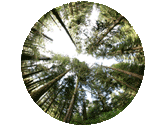Research


Since 1989 the Forest Ecology and Management research group has had a core focus on understanding forest ecosystem dynamics and using that understanding to improve strategies for forest management and conservation. Much of our focus has centred on the temperate rainforests of coastal British Columbia. This work has been foundational to new strategies for forest management embodied in ideas about Ecosystem-Based Management. Throughout this time, alongside our research we have been involved as advisors or participants in a wide range of public policy processes related to forests and land-use.
In addition to our work on coastal rainforests, we have had major emphases on dry, fire-maintained forests in the southern interior, on understanding the landscape ecology of natural disturbance regimes, on interactions between climate-fire, and the landscape, and on methods for probing the details of forest structure, disturbance, and recovery. Other recent student research has focussed on ecology and conservation in tropical rainforests of Borneo, assessing the carbon implications of different management decisions, fire risk analysis, understanding habitat thresholds in managed landscapes, and ecological restoration.
Over the last few years, we have focused increasingly on a social-ecological systems perspective for understanding and guiding management in the rainforests of the Great Bear Rainforest of coastal British Columbia (the Central Coast, Haida Gwaii, and the North Coast). This has developed largely in the context of the Hakai Network for Coastal People, Ecosystems, and Management, of which Ken Lertzman is Director. Through the Network, we have been involved in a variety of broader issues related to helping chart a path to sustainability for indigenous coastal communities, including the implementation of Ecosystem-Based Management, coastal marine ecology and management, and Herring decline and recovery.
We work closely with a number of partners. These include researchers at the BC Ministry of Forests, the Heiltsuk Nation, The Hakai Beach Institute and Tula Foundation, the Haida Gwaii Higher Education Society, CCIRA, Tides Canada, the Resilience Alliance, and the North Pacific Landscape Conservation Cooperative.
For more information, read the descriptions of individual student projects, see Ken Lertzmanís page, or see examples of our publications. You can also contact Ken, the Hakai Network, or the School of Resource & Environmental Management.

